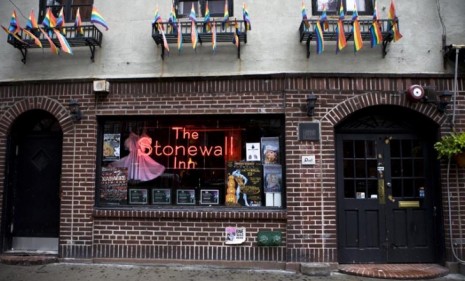The 'astounding' rise in LGBT hate crimes
Just as same-sex marriage is legalized in New York, a new report shows a sharp increase in violent attacks on members of the gay community

A report released Wednesday by the National Coalition of Anti-Violence Programs reveals that hate crimes against members of the LGBT community rose dramatically in 2010. The coalition says hate crimes tend to increase after civil rights advancements. With gay marriage making waves across the country, is this a taste of what's in store in the future? Here, a brief guide:
How severe is this problem?
The report shows an "astounding" 13 percent increase in violent crimes committed because of a victim's "perceived or actual sexual orientation, gender identity, or status as HIV positive," says Lee Romney at the Los Angeles Times. In 2010, there were 27 murders of members of the LGBT and HIV-infected community, up from 22 in 2009. In New York, where same-sex marriage was just legalized, violence against gays was up 11 percent.
The Week
Escape your echo chamber. Get the facts behind the news, plus analysis from multiple perspectives.

Sign up for The Week's Free Newsletters
From our morning news briefing to a weekly Good News Newsletter, get the best of The Week delivered directly to your inbox.
From our morning news briefing to a weekly Good News Newsletter, get the best of The Week delivered directly to your inbox.
Who's being targeted?
Transgendered women and LGBT people of color made up a disproportionate number of victims, says Instinct Magazine. Seventy percent of the murder victims were minorities, while transgendered women made up 44 percent. "Even more disturbing," these attacks "also show a higher level of brutality." There were also several attacks that occurred in and around traditionally gay-friendly areas like New York's West Village and Chelsea — "mistakenly thought to be safe neighborhoods," says Steven Thrasher at The Village Voice.
How was this data collected?
The NCAVP analyzed data submitted by 17 anti-violence programs in 15 states. The statistics may be more accurate than information collected from police, because they include crimes reported to the anti-violence groups by victims who did not seek help from law enforcement. The report says that 50 percent of LGBT hate crime victims don't make police reports. Minorities and transgendered people are the "least likely to come forward," says Romney.
A free daily email with the biggest news stories of the day – and the best features from TheWeek.com
Why is this happening?
The "copycat" phenomenon is one reason. Hate crimes typically increase after other high-profile attacks, says the NCAVP. They're also more frequent after civil rights advancements. "As we move toward full equality," says group spokeswoman Roberta Sklar, "we also have to be responsive and concerned with violence that may run alongside it."
Can anything be done to stop it?
The coalition released a list of recommendations on how to combat the rise of violence, including more research and funding devoted to collecting data on hate violence in the LGBT community. This includes more accurate information about an area's local LGBT population, how to increase access to anti-violence services and treatment, more programs and campaigns geared toward reducing hate violence, and more vocal condemnation of hate violence from policymakers and public figures. "We don't want to go back into the closet" in order to avoid hate crimes, says Sklar.
Sources: Advocate, Instinct, LA Times, Village Voice
-
 A fentanyl vaccine may be on the horizon
A fentanyl vaccine may be on the horizonUnder the radar Taking a serious jab at the opioid epidemic
-
 The 8 best comedy TV series of 2025
The 8 best comedy TV series of 2025the week recommends From quarterlife crises to Hollywood satires, these were the funniest shows of 2025
-
 Codeword: December 16, 2025
Codeword: December 16, 2025The daily codeword puzzle from The Week